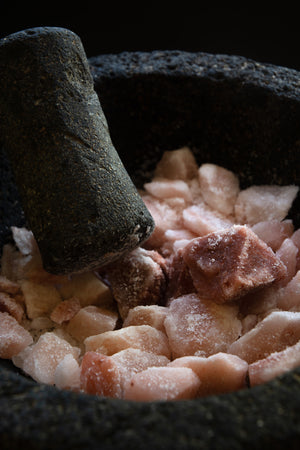Common salt is also known as sodium chloride and it occurs naturally in many parts of the world in underground deposits, in the dried-up residue of ancient seas and from sea water and lakes.
Sea salt is a broad term that generally refers to unrefined salt derived from a living ocean or sea. Typically manufacturers do not refine sea salt as much as table salt, so it still contains natural traces of other minerals including iron, magnesium, calcium, potassium, manganese and zinc. This fact has led many to believe that sea salt is a healthy alternative to table salt.
Whilst it is true that unrefined sea salts contain trace minerals they are present in minute quantities. For example, sea salts typically contain around 99.5% sodium chloride and less than 0.5% trace minerals. Many of the fancier, coloured gourmet salts also contain high sodium chloride levels – Gourmet Salt Survey - Action on Salt.
So don’t be fooled into believing that fancy salts are better for you. Whether its pink, black, rock, crystal or flakes they still have the same effect on your blood pressure as standard table salt. Salt and Your Health - Action on Salt
Action on Salt is a group concerned with salt and its effects on health based at Queen Mary University in London and are supported by 24 expert scientific members. According to their gourmet salt survey (November, 2011) – the following myths have been busted. Gourmet Salt Survey - Action on Salt
Myth 1. Gourmet salts contain less sodium than table salt so are better for your health
Gourmet salts contain as much sodium chloride as regular table salt which means they will have exactly the same effect on your blood pressure and health.
Myth 2. Gourmet salts contain minerals essential for good health
Gourmet salts are not a good source of essential minerals, instead you can get all the vitamins and minerals you need from a balanced diet with plenty of fruit and vegetables.
Myth 3. Gourmet salts taste better or stronger so you can use less
There is no evidence that people use less of any type of salt. If you prefer the flavour of a particular type of salt, and really want to use it, use less to help cut down on your salt intake. Some gourmet salts also have a larger crystal size, these might not taste as salty as finer grains so the danger is you could end up using even more!
Myth 4. Gourmet salts are ‘natural’ so are better for your health
All salt can be considered ‘natural’, a term which infers healthy, but as they are all made of sodium chloride, too much in your diet may create health problems
Myth 5. Salt is needed in food for flavour
There are plenty of great flavours around, such as herbs, spices, pepper, lemon and garlic, which can be used instead of salt to flavour food.
The Good News
You can enjoy all the taste of sea salt but with 50% less sodium by using Suölo® Reduced Sodium Sea Salt. The Suölo® range of seasonings contain pepper, spices and even seaweed which also provide flavour to your food which helps to reduce how much salt you use. The Suölo® range uses a balance of minerals including essential potassium and magnesium to reduce sodium.

